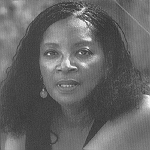

That's not to say there aren't days when you simply go hungry.
"It's feast or famine for me," says McElroy, who can spend 15 hours in an undisturbed flurry of words, producing pages of script, or find herself agonizing over a single sentence.
"You have to write everyday," says English Department Chair Shawn Wong, a novelist who led the creative writing program prior to Bierds.
"I tell my students there is no such thing as writer's block. By the end of the program, writing will be much harder then it was when you came in. You feel like you are less in charge and you have more tools at hand and more decisions to make. Writing never gets easier for graduates because they demand more of themselves the more they know."
Knowing more is the common pursuit of student and teacher: a self-knowing that enables a writer to recognize his or her own unique vision as a writer. They search for a "voice" or language that is explicitly the writer's own, created from the writer's experience of life and his or her experience of other writers' words.
"Voice is only one trick in a bag of tricks, but to me it is the most important trick,'' says Shields. "It has to do with a way of thinking that is uniquely yours. You can find fiction that has a compelling narrative and well-defined characters, but if it doesn't have a unique sound, it holds no claim on me.
"Voice is the rhetoric of a writer's way of thinking. Writers must develop a language that is all their own, that conveys to others what their brain sounds like when it's thinking," he adds. "Writing, in my opinion, is the closest human beings get to communicating completely with each other. And it's voice that does that. It's why I read. It's why I write."

McElroy likens the voice of a writer to fingerprinting: "It's how you leave your mark."
Even if you find your voice, it takes, on average, 15 years for a serious writer to turn the corner from author-peddler to peddled author. Guterson's Cedars has sold more than a million copies, but the writer paid his dues in a high school English classroom and published a book of shorter pieces and a book on home schooling before rising to literary star status.
Instead of unrealistic expectations of fast and lucrative literary success, the staff hope graduates leave the M.F.A. program with a sense of ownership in the broader community of working writers. They want former students to take their place in the literary world by continually reading, analyzing and learning from the works of classic and contemporary colleagues and then applying those lessons to their own craft.
"Writing is not a solitary act, it is an act of community,'' says graduate Frances McCue, '88. "The program allowed me to become not only a writer but a literary activist, working to put marginalized works before the public. In a sense, that community has been able to console me in the solitude of writing." McCue is a poet and executive director of Seattle's newest garden of literary support, Richard Hugo House, "a community center for readers, writers and audiences."
Balancing Act: Professors Take on Teaching and Their
Own Writing
Top Ten Faculty
for Top Ten Program
Send a letter to the editor at columns@u.washington.edu.